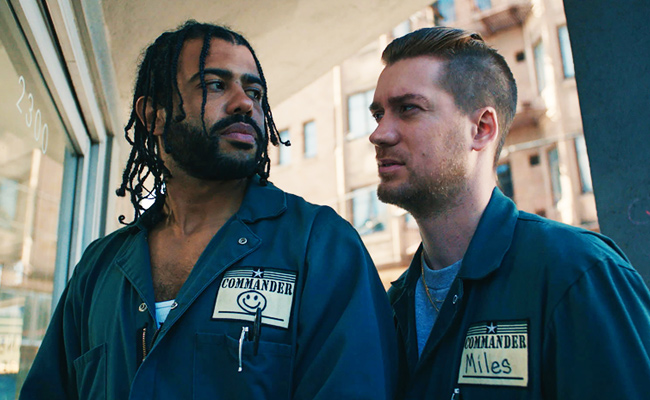
It felt fitting to learn that Blindspotting stars and writers Daveed Diggs and Rafael Casal met on the slam poetry scene at Berkeley High, because I experienced the film the way I do most slam poems. Blindspotting, a festival darling now expanding nationwide, is stylish, clever, passionate, relevant — and yet there’s a screeching earnestness to it that keeps me from falling entirely in love.
This is surely a matter of personal taste, but it’s hard for me to entirely relate to the artistic gesture of the slam poem, which is imprinted in Blindspotting‘s DNA. I understand the comedic gesture, to build tension and then to shatter it; to explore emotions by deflecting, disarming, and deconstructing. Slam poetry seems to strive for almost the opposite, to amplify, to take a feeling and live in it, unblinking. As Werner Herzog says, Za poet must never look away. Well, some of us find that level of eye contact unnerving.
Directed by Carlos Lopez Estrada, Blindspotting stars Diggs as Collin, a “big black guy with braids” (as described by multiple friends) working for a moving company in Oakland, trying to keep his nose clean on his last three days of probation. He works with his best friend, Miles (Casal), a white guy with neck tats and Macklemore hair, who wears a grill in his bottom teeth when he’s away from his black wife and son, and who could generally be said to have a “hood pass.” Collin’s ex, Val (Janina Gavankar) works the front desk while studying for her psychology degree and occasionally hectoring Collin about needing to outgrow his towniness (Oakland being known colloquially as “The Town,” in contrast to San Francisco’s “The City”). Meanwhile, the moving job gives Miles and Collin a window into the inner lives of the characters populating a rapidly gentrifying Oakland.
Oakland is having a bit of a moment, as we like to say — the setting of Black Panther, Sorry To Bother You (Boots Riley’s masterpiece), and now Blindspotting, all the work of home-grown filmmakers. Blindspotting’s Oakland pedigree is even more pronounced than the others, since there’s scarcely a character in it whose outfit doesn’t advertise “Oakland” somehow. When Collin witnesses a police-involved shooting (partly inspired by Oscar Grant, the subject of Fruitvale Station, according to Diggs and Casal in various interviews) Blindspotting weaves a police brutality subplot into its story about a changing Oakland.
Movies are almost always better when they’re about a specific place, and Blindspotting has a facility and familiarity with local slang and archetypes an outsider couldn’t fake, explained in broad character vignettes reminiscent of Spike Lee’s equally loving portrait of Bed-Stuy in Do The Right Thing. Blindspotting‘s poetry imprint also frequently comes in handy here — it’s hard to beat a snappy rhyme when it comes to explaining something slickly and succinctly.
Oakland is a multi-cultural melting pot that, like Bed-Stuy did in ’89, feels like a microcosm of broader changes while retaining its unique charm and looking great on film. Beyond the setting, the relevant social issues, and the interracial twist, though, it’s largely an old story. Collin and Miles have the old “friend from the old neighborhood who’s always fucking it up for you” vibe seen in everything from Pope of Greenwich Village to The Town (…Boys In The Hood, Menace To Society, etc). That Miles is white and Collin is black gives it a squeeze of new life, especially in a scene where Miles gets confused for an appropriating gentrifier, but a lot of the time their dynamic is a little predictable, a little sensational.
Blindspotting excels at capturing a feeling and expressing it with style and kitsch, but there are times when you wonder what new insight they’re offering beyond the rhymes. They skewer the gentrifiers with deadly accuracy, but mostly offer the same observations I’ve been hearing for 15 years (almost 10 of which I spent living across the Bay). At this point, there’s no such thing as a fresh kale bit.
We get it, gentrification sucks. Sorry To Bother You was brilliant because it went a few levels deeper, but for all its relevant concerns, Blindspotting often feels like smug nativism. Occasionally it offers a little nuance, like Collin’s mom complaining, “I’m not selling my house now, not when we finally got some good food around here,” but mostly it plays the hits — hipsters, tall bikes, skinny pants, entitled dorks, rising rents, appropriation, KALE JUICE. Blindspotting rarely goes further than “outsiders are dorks and they should leave us alone.”
I understand the sentiment and largely agree on the dork part, but… what’s the solution? Everyone stays on the land to which they were born like feudal Europe? Moreover, does living in the place where you were raised make you a cooler and more authentic person? I’m not looking for a movie to solve income inequality and erase a legacy of redlining, but I need a little more perspective than another “white people love goat cheese” joke. It’s fine, I just want… more?
Blindspotting‘s handling of police brutality/biased policing, in the form of a killer cop played by Ethan Embry, feels similarly incomplete. It’s as if Blindspotting‘s answer to insight is to simply identify a societal ill and emote at it. It was during Blindspotting‘s coupleted climax that I realized rhyming may just be its own form of deflection, albeit one that involves unnerving eye contact. Maybe we aren’t so different after all.






